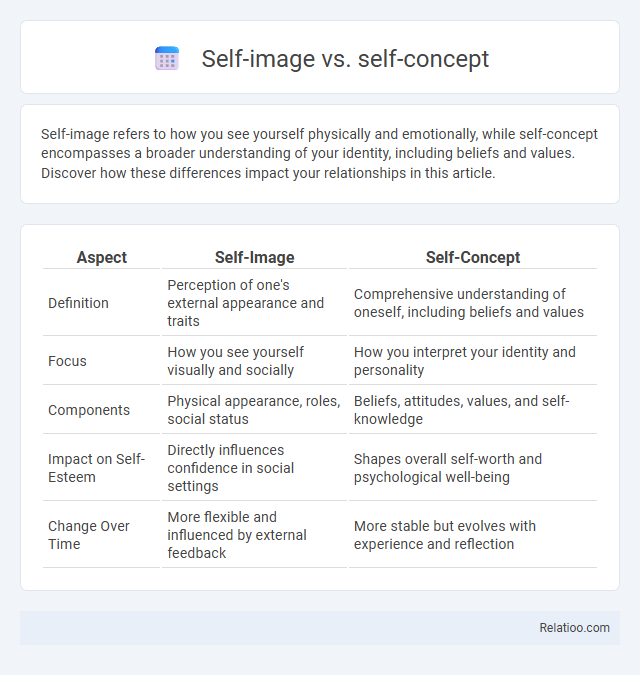Self-image refers to how you see yourself physically and emotionally, while self-concept encompasses a broader understanding of your identity, including beliefs and values. Discover how these differences impact your relationships in this article.
Table of Comparison
| Aspect | Self-Image | Self-Concept |
|---|---|---|
| Definition | Perception of one's external appearance and traits | Comprehensive understanding of oneself, including beliefs and values |
| Focus | How you see yourself visually and socially | How you interpret your identity and personality |
| Components | Physical appearance, roles, social status | Beliefs, attitudes, values, and self-knowledge |
| Impact on Self-Esteem | Directly influences confidence in social settings | Shapes overall self-worth and psychological well-being |
| Change Over Time | More flexible and influenced by external feedback | More stable but evolves with experience and reflection |
Understanding Self-Image and Self-Concept
Self-image refers to the mental picture and beliefs one holds about their own appearance and abilities, while self-concept encompasses a broader understanding of the self, including identity, values, and roles. Understanding self-image is crucial because it influences self-esteem and behavior, shaping how individuals perceive themselves in various social contexts. Self-concept integrates multiple self-images into a cohesive perception, allowing for a more comprehensive view of one's identity and psychological well-being.
Defining Self-Image: Perceptions and Influences
Self-image refers to the way you perceive yourself, encompassing your physical appearance, personality traits, and abilities as seen through your own eyes. This perception is shaped by external influences such as social feedback, cultural norms, and personal experiences that continuously mold your self-awareness. Understanding the distinctions between self-image, self-concept, and self-esteem is crucial for recognizing how your thoughts and beliefs about yourself impact your overall mental health and behavior.
What Is Self-Concept? Core Components Explored
Self-concept is your overall understanding and evaluation of who you are, integrating beliefs, values, and experiences into a coherent self-identity. Core components include self-image (how you see yourself), self-esteem (your sense of worth), and the ideal self (your aspirations and goals). These elements shape your behavior, motivation, and emotional responses by influencing how you perceive your abilities and personality traits.
Key Differences Between Self-Image and Self-Concept
Self-image refers to how individuals perceive themselves based on their appearance and social roles, while self-concept encompasses the broader understanding of one's identity, including beliefs, values, and personality traits. Key differences between self-image and self-concept include self-image being more superficial and externally influenced, whereas self-concept is deeper, incorporating internal perceptions and self-evaluations. Self-esteem often relates closely to self-image, reflecting how positively or negatively one feels about their perceived traits, while self-concept forms the foundation for overall self-awareness and personal identity.
Psychological Foundations of Self-Image and Self-Concept
Self-image refers to how individuals perceive themselves visually and behaviorally, while self-concept encompasses a broader understanding of one's identity, including beliefs, values, and roles. Psychological foundations of self-image involve sensory experiences, social feedback, and cognitive processing that shape personal perceptions and emotional responses. Self-concept develops through social interaction, internalized beliefs, and cognitive schemas, influencing behavior and self-esteem in various contexts.
Factors Shaping Self-Image and Self-Concept
Self-image and self-concept are shaped by factors such as social interactions, personal experiences, and feedback from others, with self-image reflecting how individuals perceive themselves visually and behaviorally, while self-concept encompasses a broader understanding of identity, values, and beliefs. Cultural background, family upbringing, and societal expectations heavily influence self-concept development, determining how one integrates personal traits into a coherent self-identity. Cognitive processes, emotional states, and social comparisons further impact the formation and evolution of self-image and self-concept over time.
Impact on Mental Health and Well-Being
Self-image, self-concept, and self-esteem each play distinct roles in shaping your mental health and well-being by influencing how you perceive yourself and your value. A positive self-image, which is the mental picture you have of yourself, contributes to greater confidence and emotional resilience, while self-concept integrates your beliefs, attributes, and overall understanding of who you are, directly impacting your behavior and motivation. Healthy self-esteem, reflecting your sense of self-worth, is crucial for managing stress, fostering mental stability, and promoting overall psychological wellness.
The Role of Society and Culture
Self-image, self-concept, and self-esteem are distinct yet interconnected aspects of identity shaped significantly by societal and cultural influences. Society often imposes norms and values that shape your self-concept, affecting how you perceive yourself within cultural contexts. Cultural expectations and social feedback continuously mold your self-image, impacting your confidence and sense of belonging.
Improving Self-Image vs Strengthening Self-Concept
Improving your self-image involves enhancing how you perceive your physical appearance and behavior, leading to increased confidence and a positive emotional state. Strengthening self-concept focuses on developing a deeper understanding of your values, beliefs, and identity, which fosters long-term psychological resilience and self-awareness. Both approaches complement each other in promoting overall mental well-being and personal growth.
Integrating Self-Image and Self-Concept for Personal Growth
Self-image and self-concept are intricately linked psychological constructs where self-image refers to how you see yourself physically and behaviorally, while self-concept encompasses a broader understanding of your identity, including beliefs, values, and roles. Integrating self-image and self-concept fosters personal growth by aligning your external perceptions with your internal beliefs, leading to increased self-awareness, confidence, and emotional resilience. This integration allows you to create a cohesive sense of self that supports consistent decision-making and authentic expressions of your true potential.

Infographic: Self-image vs Self-concept
 relatioo.com
relatioo.com